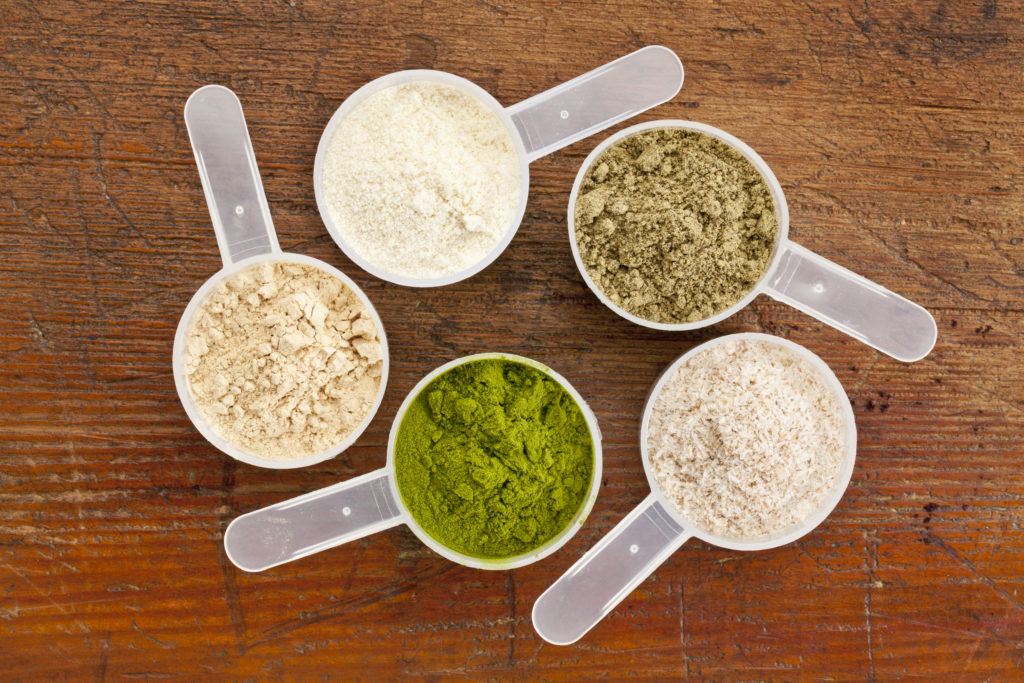
Many vegans are opting for great sources of vegan protein powder.
Though it used to be a nightmare to try to find quality vegan protein powder, that’s not the case any more.
Though whey protein (derived from cows) is still the dominant protein source in protein powder supplements, there are a plethora of great vegan protein powders out there, and they aren’t just for vegans. People with milk allergies, severe lactose intolerance, or simply an interest in getting a different amino acid profile might want to look into vegan protein powder too.
Wondering what the best vegan protein powders are? We’ve got you covered.
1. Naked Pea Protein
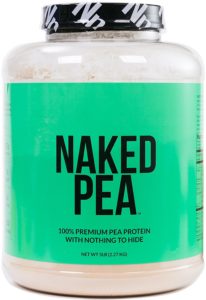
Click here for the lowest price on Amazon
Yes, there are other pure pea protein products out there, but can they make the claims that Naked Pea Protein does? It’s non-GMO, sourced from farms in North America, and it proudly advertises its independent lab testing that verifies its purity and its lack of contaminants like heavy metals.
2. Garden of Life Raw Protein and Greens
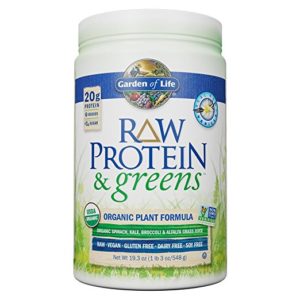
Click here for the lowest price on Amazon
As is usually the case, Garden of Life puts out a very strong protein product for vegans. Their Raw Protein and Greens blend combines sprouted brown rice protein, pea protein, and chia protein with Garden of Life’s hallmark, their proprietary blend of greens.
Adding more vegetable nutrients to your diet is never a bad thing, and doing it in conjunction with a diverse mix of vegan protein sources is even better.
3. Vega All-In-One Shake
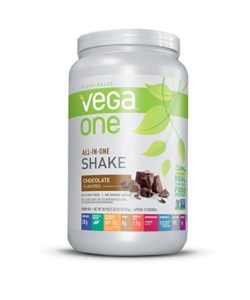
Click here for the lowest price on Amazon
If you’re looking for a little something extra, Vega’s got it. It’s a pea and hemp protein based protein powder that has the added benefit of fiber and a blend of vitamins and minerals. To top it off, it’s sweetened with stevia for taste and has fruit concentrates added for antioxidant power.
4. BulkSupplements Pure Pea Protein Powder
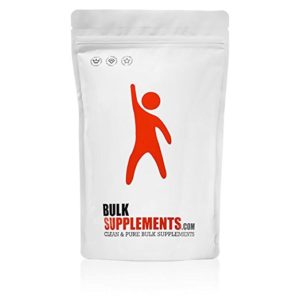
Click here for the lowest price on Amazon
Straight and simple, like the rest of BulkSupplements’ products, their pea protein is exceptionally pure and has zero adulterants, fillers, or flavorings.
Purists and minimalists will love this one, but if you want a little more flavor with your protein, there are some better options.
5. Orgain Plant-Based Organic Protein
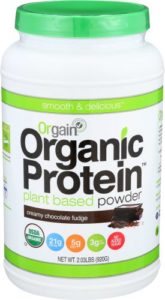
Click here for the lowest price on Amazon
Orgain includes rice, pea, chia seed, and hemp protein for a robust amino acid profile, and keeps the carb content low with sugar alcohols instead of sucrose or fructose to sweeten the mix.
There isn’t much in the way of additional nutrients, but if you want a protein shake that is creamy and flavored so it doesn’t taste like chalk, Orgain is a solid choice.
6. NOW Sports Pea Protein
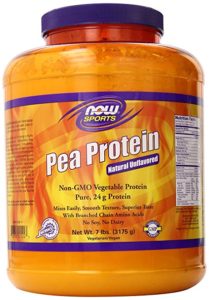
Click here for the lowest price on Amazon
Now Sports is a straight and simple, no-nonsense vegan protein powder. There’s only one ingredient, and it’s non-GMO yellow pea protein isolate, the purest and most concentrated form of protein.
If you know that all you need is pure protein, NOW sports is the way to go.
7. VeganSmart All-In-One
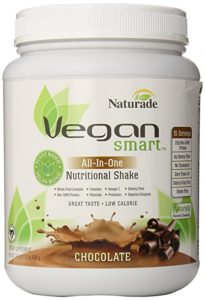
Click here for the lowest price on Amazon
VeganSmart takes the crown for the most diverse vegan protein profile. It’s got hemp, pea, chia, potato, and chlorella protein, plus a good vitamin and mineral mix.
Strict paleo and low-carb enthusiasts will scoff at the sugar content (a relatively mild five grams per serving and 14 grams of total carbohydrates), so it’s not for everyone, but if you aren’t on the low carb bandwagon, it’s a good choice.
8. Clean Lean Protein
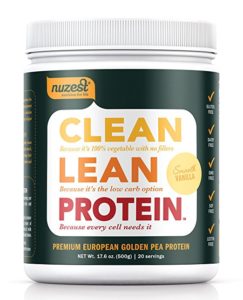
Click here for the lowest price on Amazon
Clean Lean Protein’s main selling points are its alkaline pH and its minimal processing. It’s just pea protein powder, alongside vanilla flavoring and thaumatin, a protein extracted from a fruit that acts as a non-caloric sweetener. Going on an alkaline diet? Go with Clean Lean Protein.
9. MRM Veggie Elite Performance Protein
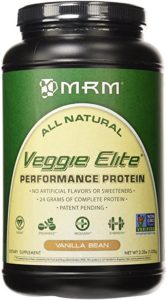
Click here for the lowest price on Amazon
MRM offers a combination of rice and pea protein without a whole lot extra. There are some natural flavoring agents and a combination of stevia and monk fruit extract, which are both non-caloric natural sweeteners.
The only real point of distinction for MRM Veggie Elite is its inclusion of a proprietary enzyme called Digest-All, which is supposed to increase your ability to absorb the protein in the blend. However, absorption of protein from protein powder isn’t typically a problem, so the utility of this is questionable.
10. Promix Vegan Complete
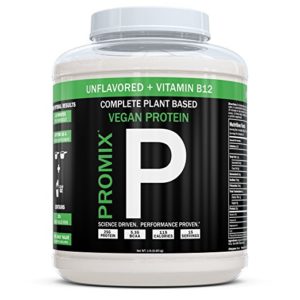
Click here for the lowest price on Amazon
Promix is a blend of pea protein and sprouted brown rice protein. Other than that, the only real unique aspect about it is its inclusion of 200% of your daily recommended intake of vitamin B.
However, without the other B complex vitamins, or any larger micronutrient strategy, it feels like more of a gimmick than a selling point.
Vegan protein benefits and side effects
Vegan protein is derived entirely from plant sources and is useful not just for vegetarians and vegans, but for people looking for a greater variety in their amino acid profiles.
The primary reasons most people use vegan protein are obvious–they don’t consume animal products, for health, environmental, or ethical reasons. So, most popular protein products like whey and casein protein are out of the question.
There are ancillary benefits associated with vegan protein powders, too: they don’t have the dairy allergens that whey and casein protein powders have, and they also have zero lactose content.
While most people who are lactose intolerant can handle whey protein without any trouble, seeing as it’s less than one percent lactose by weight (1), some people who are exceptionally sensitive, or who want to keep their total lactose consumption as close to zero as possible, can benefit from a vegan protein powder.
Benefits
Clearly, the benefits of protein as a whole apply to vegan protein powder in particular. In short, consuming a protein supplement on a regular basis can help you gain muscle (2), lose fat (3), preserve lean mass while losing weight (4), and even increase your bone strength (5).
But, beyond that, what do the specific benefits of vegan protein powder look like? One key component to help answer this question is the amino acid profile of a particular protein source.
Amino acids are the basic building blocks of all of the different kinds of proteins in the cells in your body, and foods containing different protein sources have a different ratio of amino acids.
Some amino acids are essential–you can’t live without them, and your body can’t synthesize them from other amino acids. There are a total of twenty different amino acids that your body uses, and nine of these are the essential amino acids (6).
Fortunately, all of the heavy-hitting vegan protein powder sources contain all nine essential amino acids. These include pea protein, hemp protein, and chia protein.
Though they contain these proteins in different ratios, combining multiple sources can provide a robust amino acid profile that will fill all your dietary needs.
When it comes to what kind of protein is “best,” animal proteins tend to be superior to vegetable proteins, according to a 2004 scientific article by Jay R. Hoffman and Michael J. Falvo at the College of New Jersey (7).
They reviewed the benefits of a variety of protein sources, and recommended casein, a dairy-derived protein, as the best single source of protein. However, the news isn’t all bad for vegan protein powder lovers. By combining protein from different vegetable sources, you can match the same benefits as an animal-based protein supplement.
So, is there one kind of vegan protein better than another? Fortunately, nutritionists have studied this very intently, and have come up with a metric called the protein digestibility-corrected amino acid score.
This metric uses the digestibility of cow’s milk (which is rapidly and easily digested, as long as you aren’t lactose intolerant) as the reference for protein digestion.
Different protein sources are ranked as a decimal, with 1.0 representing absorption equal to cow’s milk, and smaller numbers representing fractions of that–so 0.5 would mean a protein source is absorbed only half as well as cow’s milk.
Among the best vegan protein sources are soy protein (1.0), pea protein isolate (0.89), with rice protein and hemp protein performing worse, but still above 0.5 (8, 9). Chia seed protein is a pretty new commercial concept, so there isn’t much good info out there its amino acid score.
What this means is that you should shoot to have at least some of your vegan protein come from one of the high quality sources: soy or pea protein.
Side Effects
Protein, as one of the three major macronutrients in your diet, doesn’t have much in the way of side effects. Especially with vegan protein powders–these products avoid the common commercial contaminants that can cause food allergies in some people.
Supplement companies know that many of their vegan protein powder customers are choosing their products to avoid allergenic contaminants like wheat and dairy. Soy is one moderately common allergen that can be associated with food allergies, so do be aware of cross-contamination.
Labels that claim they are “soy free” or “gluten free” have to pass strict purity standards to make that claim, so if you see that on the label, you’re safe. The thing to watch out for is phrases like “processed in a facility that also processes eggs, dairy, tree nuts…”
This means that the company is using the same equipment to package different products, so there is a decent chance that there will be allergens from the other products that the company produces, so if you have special food sensitivities, you do need to be aware of this.
In some flavored products, there are potential side effects associated with sweetening agents. A few products on the market include sugar alcohols, which can cause gastrointestinal side effects when consumed in high doses (10).
However, it’s unlikely that you’ll ever encounter this problem unless you are extremely sensitive or are consuming a tremendous amount of flavored protein powder on a daily basis.
Recommended Dosage
Protein is an extraordinarily well-studied nutrient, and recommendations for dosage are down to a science. For athletes trying to build muscle, the scientific literature recommends consuming 1.3-1.8 grams of protein per kilogram of body mass per day, divided up into at least three meals of equal protein content.
People who are restricting their dietary intake to lose weight might even bump this up to 2.0 grams of protein per kilogram of body mass per day in order to maintain lean body mass while dropping fat mass (11).
For endurance athletes and for less active people, protein needs are more on the order of 1.0 grams per kilogram of body mass (12).
One important thing to keep in mind is that even the most highly pure protein powders are not 100% protein. They’re usually more like 80-90%. If the blend includes a lot of flavoring agents, superfood powders, and the like, the protein content may be even lower. Check the nutrition label so you can do the math on your protein powder of choice.
If, for example, you weigh 180 pounds (82 kilograms) and you have a protein powder that contains 20 grams of protein per 24 gram scoop, you can use these numbers to find out how much actual protein you need per day.
If you are trying to lose fat mass while maintaining lean body mass, you’d need up to 164 grams of protein per day.
Now, hopefully all of this isn’t going to come from your protein powder, so you’ll have to take the rest of your diet into account. Once you’ve estimated how much protein the rest of your diet contains (you don’t need to be precise, a rough guess will do) perhaps you find you still need 70 grams of protein. This would be 3.5 scoops of your protein powder.
Recap
Vegan protein doesn’t need to mean suboptimal nutrition. By choosing a vegan protein supplement with a complete amino acid profile and good digestibility, you can get the same benefits as you’d get from a high-quality animal protein.
The best vegan protein sources are soy and pea protein powders, so make sure at least some of your vegan protein intake comes from these sources.
By using scientifically-validated guidelines for selecting your protein dosage per day and selecting the right supplement, you can set yourself up for achieving your personal health goals.
https://bodynutrition.org/vegan-protein-powder/ http://bodynutritionorg.tumblr.com/post/166140593749
No comments:
Post a Comment